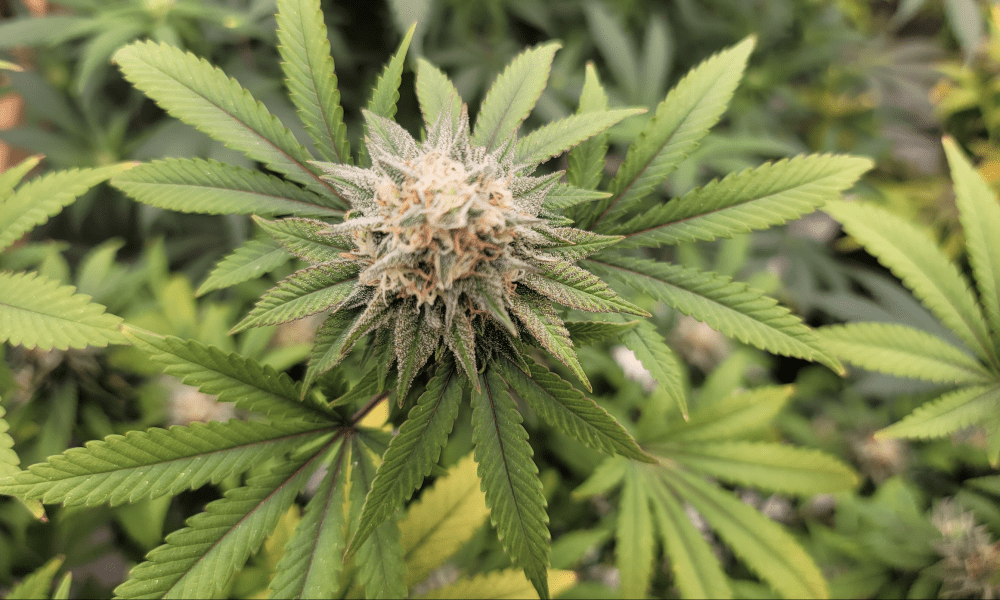The Texas legislature has passed a bill that would create a state-backed research consortium to conduct clinical trials on ibogaine as a possible treatment for substance use disorders and other mental health conditions, with the goal of developing a drug that would win U.S. Food and Drug Administration (FDA) approval.
The state would retain a commercial interest in “all intellectual property that may be generated over the course of the drug development clinical trials,” the legislation says, with a goal of making Texas a hub for “ibogaine-related biomedical research, development, treatment, manufacturing, and distribution.” A quarter of revenue taken in by the state from any resulting intellectual property would fund veterans programs.
Lawmakers in the House and Senate over the weekend both approved a conference committee version of the proposal, SB 2308, which next heads to the governor’s desk.
Rather than create a state grant program to support research on the psychedelic, as previous forms of the bill would have done, the compromise version would establish a “consortium”—including an institution of higher education, a hospital and a drug developer—to develop and test ibogaine drugs in an effort to secure FDA approval.
The educational institution would serve as the consortium’s leader, representing the group to the state Health and Human Services Commission (HHSC) and handling administrative functions. It would further be responsible for submitting “a proposal and request for funding on behalf of the consortium for purposes of conducting ibogaine drug development clinical trials in accordance with this subchapter.”
Along with the legislation’s goal of winning FDA approval as a clinical treatment, the bill says it also seeks “a breakthrough therapy designation for ibogaine”—a designation FDA gives to emerging treatment options that haven’t yet secured agency approval to treat a particular condition.
Reformers are cheering lawmakers’ passage of the proposal. Bryan Hubbard, executive director of the American Ibogaine Initiative and an architect of the bill, said of the final version that “I have to give the legislature an A across the board.”
“I think that it can stand up as a national model for other states that wish to replicate it in some form or fashion,” he said in an interview on Monday with Marijuana Moment, thanking in particular sponsors Sen. Tan Parker (R) and Rep. Cody Harris (R) as well as House Speaker Dustin Burroughs (R) and Lt. Gov. Dan Patrick (R), who presides over the Senate.
“Without the courage and vision of those four individuals, none of this would have happened,” Hubbard said, “and I am forever grateful to Texas leadership for making this, in my estimation, one of the greatest single achievements in the history of the of the American psychedelic movement.”
The program would be funded through a $50 million appropriation from the state general fund, which would go to HHSC for disbursement to cover the drug development trials, according to a conference committee report for SB 1, a massive state budget bill.
Members of a bicameral conference committee on the ibogaine legislation filed their report and the amended bill last week, and lawmakers in both chambers have since signed off on it.
The bill next proceeds to Gov. Greg Abbott (R), who Hubbard said is expected to sign it into law.
The final proposal passed the Senate on a 26–5 vote and the House 134–4 vote.
Before the Senate approved the agreement, Parker, the bill’s lead sponsor, pointed out that the conference committee version would now appropriate state funds for ibogaine research as well as establish a plan for how to move forward with FDA approval. Private gifts, grants and donations would also be accepted.
“Initially, no state funding was appropriated for the initiative,” Parker explained. “However, that has now changed, making it critically important to implement clear, comprehensive guidelines and regulatory measures.”
A fiscal note on the final conference committee bill says HHSC would need to appropriate money “to fund the consortium’s clinical trials, but the cost of such funding is unknown at this time.”
As for revenue stemming from intellectual property resulting from the research and new drug development, the analysis says the amount “is indeterminate and would be dependent on the drug development trials.”
State revenue would flow into Texas’s general fund, and from there 25 percent would be earmarked “only to programs that assist veterans in this state.”
Rep. Greg Bonnen (R) said on the House floor before the vote on the proposal that said “the state will have negotiated for royalties at a minimum of 20 percent.”
“What this legislation is doing is it’s setting up a drug trial to study, hopefully, the effectiveness of the drug,” he told colleagues, calling for approval of the conference committee report.
Hubbard, of the American Ibogaine Initiative, said he believes the state having a vested interest in intellectual property produced by the research will ensure Texans see “a perpetual return on their investment.”
“Most Americans, I believe, have had enough of public dollars going into the pockets of private corporations with no return on investment for the taxpayer,” he said. “With the way in which Texas has set this project up, Texas taxpayers are going to be fully vested partners in this endeavor, and the people of Texas will see—if we are successful—perpetual return on their investment that will hopefully be used to assure universal treatment access through a top-notch, ibogaine-based treatment and recovery system as time and circumstances evolve.”
Because the conference committee went outside its jurisdiction in adding new provisions to the bill—by establishing the new consortium, for one—both chambers additionally had to approve resolutions allowing the panel’s actions to proceed.
—
Marijuana Moment is tracking hundreds of cannabis, psychedelics and drug policy bills in state legislatures and Congress this year. Patreon supporters pledging at least $25/month get access to our interactive maps, charts and hearing calendar so they don’t miss any developments.

Learn more about our marijuana bill tracker and become a supporter on Patreon to get access.
—
Earlier this month, before the House’s initial approval of the bill, Harris argued that “ibogaine isn’t just another drug.”
“It’s a whisper of redemption in a single dose,” he said. “It can silence the screams of withdrawal, quiet cravings that chain people to addiction and mend the broken pieces of a mind ravaged by trauma.”
“One million Texans wrestle with opioid use disorder,” Harris added. “Countless more carry the silent burdens of depression, anxiety and [traumatic brain injury]. Ibogaine could be their miracle.”
An earlier analysis of the legislation said that opioid use disorder (OUD) “continues to be one of the most insidious threats to public health of our time, devastating individuals, families, and communities across Texas and our nation,” and “current treatment options are often unsuccessful in treating OUD and lives are lost as a result.”
Hubbard noted that the new Texas plan is similar to an ibogaine research proposal a few years ago in Kentucky that he also helped design. That bill would have distributed at least $42 million in funding for research into ibogaine’s potential to treat opioid addiction.
The effort fell through in late 2023 after the state’s new attorney general replaced Hubbard, who was then serving as chair of the Kentucky Opioid Commission, with a former Drug Enforcement Administration (DEA) official.
Last year advocates tried to enact a similar plan in Ohio.
“The legislation that you see is the Kentucky plan as implemented by the state of Texas,” Hubbard said. In terms of the consortium, the way that they have set this up is to create a cooperation framework on the front end that I had always envisioned occurring on the back end.”
“When this program was designed for Kentucky, I had in mind that we would essentially send out an RFP [request for proposals] for a drug developer, send out an RFP for a trial site, and to pick the best. And to pair the drug developer with trial science on the back end,” he explained.
“In the Texas framework, this is a cooperative partnership that will have to be built on the front end by those who want to be able to pursue this opportunity,” Hubbard continued. “There is a role for both universities and private hospitals, which is important because they each have significant things to contribute.”
HHSC will retain control over the consortium, he said, “and the reason that that legal authority needs to be there is because you want the absolute best drug developer and you want the absolute best aggregation of trial sites within Texas, who can make sure that these trials are done safely, efficiently and effectively.”
Last month, meanwhile, the Texas House passed a pair of bills designed to ensure speedy access to psychedelic-assisted therapy in the event of FDA approval, but they did not clear the Senate by the end of the session.
More recently, lawmakers over the weekend passed a bill to significantly expand the state’s medical marijuana program, sending it to the governor.
Just days after the legislation from Rep. Ken King (R) advanced through the Senate, with amendments that watered down the original House proposal, bicameral negotiators worked out a compromise over the weekend and then each chamber gave final approval on Sunday.
The final version of the bill—which cleared the House on a 138-1 vote and the Senate by a vote of 31-0—would expand the state’s list of medical cannabis qualifying conditions to include chronic pain, traumatic brain injury (TBI), Crohn’s disease and other inflammatory bowel diseases, while also allowing end-of-life patients in palliative or hospice care to use marijuana.
Lawmakers on Sunday passed a resolution adding Crohn’s disease and other inflammatory bowel diseases back into the bill as well, which Sen. Charles Perry (R) said on the floor were “inadvertently left out by the drafter late last night.”
Under the final bill now heading to the governor’s desk, patient registrations would be good for one year, with up to four refills of a 90-day supply. Medical cannabis packages, containers and devices would be allow to include up to 1 gram of total THC, with a 10 mg/dose limit.
Lawmakers also adopted resolutions on Sunday to clarify that a physician “may prescribe more than one package of low-THC cannabis to a patient in a 90-day period.”
If ultimately signed into law, the bill would build upon Texas’s current, limited medical marijuana program, which allows patients with one of eight qualifying condition access certain non-smokable cannabis products containing no more than 0.5 percent THC by dry weight.
This comes in the background of a highly contentious debate over another piece of legislation that was sent to Abbott last month to ban consumable hemp products containing any amount of THC, even though federal law permits hemp products containing up to 0.3 percent THC by dry weight.
Democrats have attacked the bill as an assault on personal liberty and gone after Patrick, the lieutenant governor, for his zeal around the ban.
Meanwhile in Texas, a House committee approved a Senate-passed bill last month that would prohibit cities from putting any citizen initiative on local ballots that would decriminalize marijuana or other controlled substances—as several localities have already done despite lawsuits from the state attorney general.
Under the proposal, state law would be amended to say that local entities “may not place an item on a ballot, including a municipal charter or charter amendment, that would provide that the local entity will not fully enforce” state drug laws.
While several courts have previously upheld local cannabis decriminalization laws, an appellate court comprised of three conservative justices appointed by the governor has recently pushed back against two of those rulings, siding with the state in its legal challenge to the marijuana policy in Austin and San Marcos.
Despite the ongoing litigation and advancement of the House and Senate bills, Texas activists have their targets set on yet another city, Kyle, where they hope put an initiative before voters to enact local marijuana reform at the ballot this coming November.
A recent poll found that four in five Texas voters want to see marijuana legalized in some form, and most also want to see regulations around cannabis relaxed.
Trump Wants To Delete State Medical Marijuana Protections From Budget While Continuing To Block Cannabis Sales Legalization In D.C.
Photo courtesy of Flickr/Scamperdale.



























































